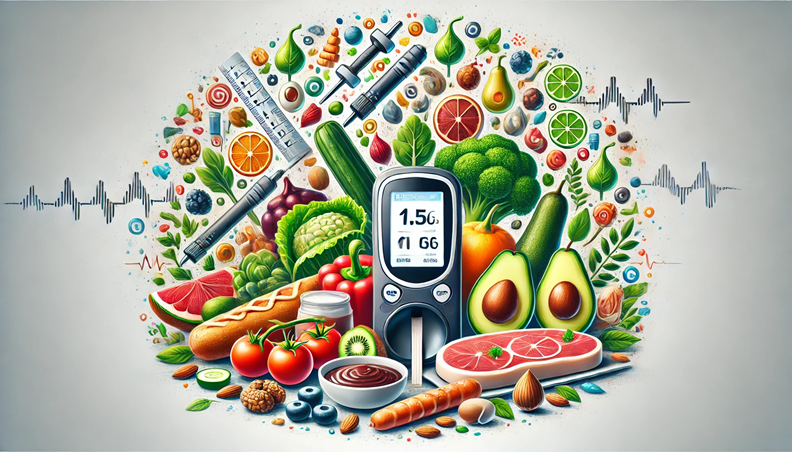Low-Carb Diets and Diabetes: What You Need to Know

For individuals managing type 2 diabetes, diet plays a critical role in controlling blood sugar levels and overall health. Among various dietary approaches, a low-carb diet has gained significant attention. While this eating plan offers numerous benefits for people with diabetes, it also comes with some potential risks. Here’s a closer look at how low-carb diets impact diabetes management and what you need to know to make informed decisions.
What Is a Low-Carb Diet?
A low-carb diet involves reducing the intake of carbohydrates and increasing consumption of protein and healthy fats. Carbohydrates are the primary source of glucose in the bloodstream, and by limiting them, individuals can better manage blood sugar levels.
The amount of carbohydrates considered « low » can vary but generally falls between 20 to 100 grams per day. This range allows for flexibility to meet individual health needs and preferences.
For a deeper understanding of how low-carb diets impact diabetes, check out Low-Carb Diet: Benefits and Risks for Diabetics.
Benefits of Low-Carb Diets for Diabetics
- Improved Blood Sugar Control:
By reducing carb intake, blood sugar spikes become less frequent, allowing for more stable glucose levels. This can result in a decreased need for insulin or other diabetes medications. - Weight Loss:
Many people with type 2 diabetes struggle with weight management. Low-carb diets often promote fat loss, especially around the abdominal area, improving insulin sensitivity. - Lower Risk of Complications:
Better blood sugar control and weight management contribute to reduced risks of diabetes-related complications, such as heart disease and neuropathy. - Improved Cholesterol Levels:
A low-carb diet that includes healthy fats, such as those from avocados, nuts, and olive oil, may improve HDL (good cholesterol) levels and lower triglycerides.
Potential Risks of Low-Carb Diets for Diabetics
While the benefits are compelling, it’s essential to consider the potential drawbacks of a low-carb diet:
- Nutrient Deficiencies:
Eliminating or significantly reducing carbs can limit the intake of essential vitamins and minerals found in fruits, whole grains, and legumes. - Keto Flu:
Drastically cutting carbs may lead to temporary side effects like fatigue, headaches, and irritability as the body adjusts to using fat for energy instead of glucose. - Risk of Hypoglycemia:
For those on insulin or other glucose-lowering medications, a low-carb diet can increase the risk of low blood sugar episodes. Regular monitoring and adjusting medication may be necessary. - Sustainability Challenges:
Some people find it challenging to stick to a low-carb diet long-term, especially if it feels overly restrictive.
For more insights on balancing the benefits and risks of this eating plan, explore Low-Carb Diet: Benefits and Risks for Diabetics.
How to Safely Follow a Low-Carb Diet with Diabetes
- Consult a Healthcare Professional:
Before making any dietary changes, discuss your plans with a doctor or dietitian, especially if you take diabetes medications. - Prioritize Nutrient-Rich Foods:
Focus on low-carb vegetables (like leafy greens), lean proteins, and healthy fats. Include a variety of foods to avoid deficiencies. - Monitor Blood Sugar Levels:
Frequent blood sugar checks can help you understand how your body responds to dietary changes and prevent hypoglycemia. - Stay Hydrated and Get Electrolytes:
A low-carb diet can lead to fluid and electrolyte imbalances. Drink plenty of water and include sources of potassium and magnesium, such as avocados and nuts. - Set Realistic Goals:
A sustainable diet is one you can stick with long-term. Experiment with different low-carb recipes and find what works best for your lifestyle.
Sample Low-Carb Meal Plan
- Breakfast: Omelet with spinach, mushrooms, and a side of avocado.
- Lunch: Grilled chicken salad with mixed greens, olive oil, and balsamic vinegar dressing.
- Dinner: Pan-seared salmon with steamed broccoli and cauliflower rice.
- Snack: A handful of almonds or a hard-boiled egg.
Conclusion
A low-carb diet offers a promising approach to managing type 2 diabetes by stabilizing blood sugar levels, aiding weight loss, and reducing the risk of complications. However, it’s essential to balance the benefits with potential risks and work with your healthcare team to tailor the diet to your needs.
For further guidance and detailed advice, check out Low-Carb Diet: Benefits and Risks for Diabetics. By understanding the full picture, you can make empowered decisions about your health and well-being.






